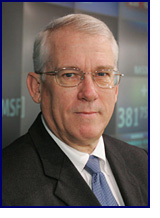Side Story: Ask An Expert — Understanding Workers' Comp Insurance
Words: Dan KamysMay 2008
Consulting
 C. Allen Bradley, Jr.
President and CEO
AMERISAFE
C. Allen Bradley, Jr.
President and CEO
AMERISAFE
Masonry: How are rates determined for workers' compensation insurance?
Bradley: Every state has a "statistical agent." In many states, this is the National Council of Compensation Insurance (NCCI). Insurance companies and self-insured employers report loss and payroll information by job description (class code) to the statistical agent who develops a loss cost (LC) per $100 of payroll. This LC is the anticipated cost of losses for each job description and serves as the building block for rates in most states.
Some states, like Florida and Wisconsin, publish premium rates that all insurers must use. However, in most states, the regulatory body approves the LC for each job description. Those states allow carriers to obtain an approved loss cost multiplier (LCM) to cover the overhead cost for their services: safety services, claims handling, investigation costs, filing costs, audit expenses, policy issuance and governmental compliance.
For example, if the approved LC for a given job description was $10, and the carrier used an approved LCM of 1.40, the manual premium rate would be $14 per $100 of payroll ($10 X 1.40 = $14). These LCMs vary from carrier to carrier. And, as loss experience and state-approved loss costs change, carriers make changes to their LCMs for that particular state. As LCs decrease, carriers' overhead does not. It costs pretty much the same to handle a $5,000 premium account as it does a $20,000 account. Therefore, many carriers have minimum premiums. State departments of insurance must approve a carrier's LC multipliers and rating plans.
Finally, insurers can apply a debit or a credit to their manual premium rate (LC x LCM) based upon the characteristics of a particular account. This debit or credit is called "schedule rating." The purpose of schedule rating is to customize the pricing on the account, based on the carrier's opinion of the risk relative to the average risk. Employers need to remember that one carrier's credit may be another carrier's debit in most states. Comparing net rates and services is a better gauge than labels of credits or debits, or even estimated annual premiums.
Masonry: What are "experience modifiers," and how do they affect rates?
Bradley: An experience modifier is the tool that tells a carrier, an agent and an insured how that particular business compares to others in the same industry in that state. Experience modifiers (ERM or Mod) are calculated by the statistical agent of the state and are the result of an approved formula that incorporates a specific employer's number of claims, his cost of those claims and his payroll, all for a three-year period starting four years ago. By comparing that data with all other businesses in the same industry for the same period, a relative experience factor is determined.
Using payroll allows for a fair comparison, whether you are a large or small operation. One's mod may change every year as the oldest year's data drops off, and the latest year is added. The most recent year isn't used, because claims can be filed on a policy even after that policy year has ended. Plus, any claim that occurs may not be finalized or "closed" by the end of the policy year.
Most states employ the services of the NCCI as statistical agent to track all its employers and their data. The NCCI generates an Exp Mod Worksheet for each business whose workers' compensation is with a standard carrier that reports data to the NCCI. This is important information for an insured. On this summary, he can see how his claims affect his current rates, what the trend is, and what he can expect going forward. While states and carriers determine the LCs, LCMs and credits or debits, insureds have the greatest impact here. The Exp Mod is multiplied by the rate to determine an insured's final rate. That Exp Mod belongs to the insured and follows him from year to year, and carrier to carrier, changing each year on the anniversary rating date. Everyone starts with a 1.0. I have seen Exp Mods at 0.67 (a 33 percent credit or discount) and a 2.73 (a 173 percent debit or increase), so it can make a large difference in your insurance cost.
Masonry: How much does the location of a company (region/state) affect rates, if at all?
Bradley: As we discussed earlier, states have an enormous impact on the rates. Workers' comp insurance is largely regulated on a state-by-state basis. Benefits, claims experience, statutes and taxes differ from state to state, and the premiums reflect those differences. An operation that has employees working in multiple states will have rates for each of those states in their classifications. Some states are conservative in their benefit levels and tough on workers' compensation fraud, and have lowered costs to insureds. Other states are more liberal with benefits, or their courts are less predictable to carriers that tend toward higher rates.
Your agent and your carrier must know the states in which you operate. That is how they know what rules are going to apply and what costs can be expected. Not telling your agent and carrier where you are working can cost you money or even jeopardize your coverage. Some states have special reporting requirements, and failing to meet those obligations can cost you more than just higher premiums.
C. Allen Bradley Jr. is president and CEO of AMERISAFE. For more information, call 800-897-9719.